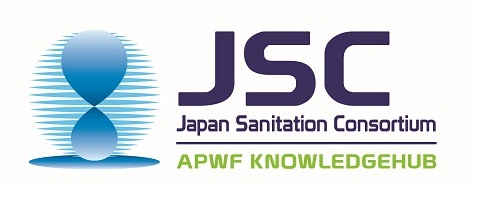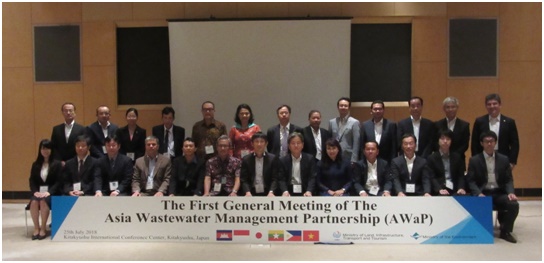
► NEWS & EVENTS
The First General Meeting of the Asia Wastewater Management Partnership (AWaP)

Session date & time: 25 July 2018; 9:00-11:55
Session venue: Kitakyushu International Conference Center - Kitakyushu, Japan
Session organizer: Asia Wastewater Management Partnership (AWaP) Secretariat
Chairperson: Dr. Taku Fujiwara - Professor; Faculty of Agriculture and Marine Science; Department of Agirculture, Forestry, Bioresource and Environmental Sciences; Kochi University; Japan
Moderator: Mr. Pierre Flamand - Manager of International Affairs; Japan Sanitation Consortium (JSC)
Participating institutions:
- Indonesia - Ministry of Public Works and Housing
- Myanmar - Ministry of Construction
- Philippines - Department of Public Works and Highways
- Vietnam - Ministry of Construction
- Ministry of the Environment (MOE); Environment Management Bureau; Water Environment Division & Environmental Regeneration and Material Cycles Bureau; Waste Management Division: Office for Promotion of Johkasou
- United Nations Economic and Social Commission for Asia and the Pacific (UNESCAP)
- World Health Organization (WHO)
- Asian Development Bank (ADB)
- Japan Sewage Works Agency (JS)
- Japan Sanitation Consortium (JSC)
Background & session overview:
1. In response to the set of the SDGs (Sustainable Development Goals) in 2015, and to achieve the Target 6.3, which aims to "halve the proportion of untreated wastewater by 2030 ", further efforts in the sector are necessary in Southeast Asia where wastewater treatment rate is low.
2. Japan’s Ministry of Land, Infrastructure, Transport and Tourism (MLIT) proposed the establishment of the Asia Wastewater Management Partnership (AWaP) as the first partnership focusing on wastewater management in The Third Asia-Pacific Water Summit (December 11th and 12th, 2017 in Yangon, Myanmar). Based on this proposal, the necessity of establishing a regional network for knowledge sharing was stated in the Yangon Declaration.
3. Following up on this announcement in the Yangon Declaration, MLIT and the Ministry of the Environment (MOE) jointly held the “Preparation Workshop of Asia Wastewater Management Partnership (AWaP)”. In this workshop, each participant country agreed to establish a multilateral partnership.
4. In order to achieve the SDGs Target 6.3, AWaP aims to mainstream wastewater management in the partner countries, by sharing good practices and excellent technologies/knowledge on wastewater policies with government officials. It is also aimed that the partner countries work in cooperation on the issues commonly shared by them.
5. This first general meeting was held in Kitakyushu City, Fukuoka Prefecture, Japan on July 25th, 2018. The participants included members from five countries (Cambodia, Indonesia, Myanmar, Vietnam and Japan), and concerned organizations (the World Health Organization-WHO; video presentation, the United Nations Economic and Social Commission for Asia and the Pacific-UNESCAP, the Asian Development Bank-ADB; as observer, the Japan International Cooperation Agency-JICA, the Water Environment Partnership in Asia-WEPA, the Japan Sewage Works Agency-JS, and the Japan Sanitation Consortium-JSC). The aim of the meeting was to discuss on the work plan for the following five years.